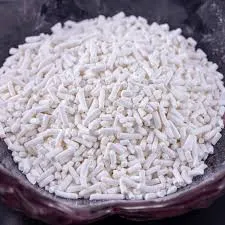
poly butadiene rubber
Polybutadiene Rubber Properties, Applications, and Advantages
Polybutadiene rubber (BR) is a synthetic rubber that has gained prominence in various industrial applications due to its unique properties. Developed in the 1930s, polybutadiene is produced through the polymerization of butadiene—a colorless gas that is a byproduct of refinery processes. This elastomer is characterized by its high resilience, excellent wear resistance, and low rolling resistance, making it a preferred choice in several industries.
Polybutadiene Rubber Properties, Applications, and Advantages
In the tire industry, polybutadiene rubber is a vital ingredient in the formulation of tire treads. Its low rolling resistance contributes to improved fuel efficiency, making vehicles more economical to operate. Furthermore, the high resistance to wear enhances the longevity of tires, which is a significant advantage for both manufacturers and consumers. Polybutadiene’s compatibility with various fillers and other rubber compounds allows manufacturers to tailor the rubber properties to meet specific performance criteria, such as grip and traction under different driving conditions.
poly butadiene rubber

Another significant application of polybutadiene rubber is in the production of adhesives and sealants. Its excellent adhesion properties ensure a strong bond between surfaces, which is critical in construction and automotive industries. The chemical resistance of polybutadiene also makes it suitable for environments where exposure to oils, chemicals, and extreme temperatures is a concern.
In addition to its mechanical properties, polybutadiene is also valued for its environmental benefits. As a synthetic rubber, it can be produced with controlled properties and consistent quality, reducing the variance seen in natural rubber production. Additionally, advancements in recycling technologies are enabling the recovery and reuse of polybutadiene rubber, contributing to more sustainable manufacturing practices.
However, polybutadiene is not without drawbacks; it can be prone to oxidation and UV degradation over time. To mitigate these issues, manufacturers often incorporate stabilizers and antioxidants into the rubber formulation, extending the product's lifespan and maintaining its performance over time.
In summary, polybutadiene rubber is a versatile and valuable material widely used across various industries. Its unique properties, including high elasticity, wear resistance, and fuel efficiency, make it an essential component in tire manufacturing, adhesives, and many other applications. As technological advancements continue to emerge, the potential for further enhancing the performance and sustainability of polybutadiene rubber is promising, ensuring its relevance in the materials landscape for years to come.
-
Sodium Dichloroisocyanurate Safety Handling ProtocolsNewsJul.29,2025
-
Mining Chemicals for Copper Extraction Processes GuideNewsJul.29,2025
-
Fertilizer for Sale Shipping and Storage TipsNewsJul.29,2025
-
Dimethyl Disulfide as Sulfurizing AgentNewsJul.29,2025
-
Benzotriazole Safety Data Handling and Storage GuidelinesNewsJul.29,2025
-
Ammonium Bicarbonate Safety Handling Storage GuidelinesNewsJul.29,2025
-
The Transformative Role Of Trichloroisocyanuric Acid in Water TreatmentNewsJul.23,2025
Hebei Tenger Chemical Technology Co., Ltd. focuses on the chemical industry and is committed to the export service of chemical raw materials.
-

view more DiethanolisopropanolamineIn the ever-growing field of chemical solutions, diethanolisopropanolamine (DEIPA) stands out as a versatile and important compound. Due to its unique chemical structure and properties, DEIPA is of interest to various industries including construction, personal care, and agriculture. -

view more TriisopropanolamineTriisopropanolamine (TIPA) alkanol amine substance, is a kind of alcohol amine compound with amino and alcohol hydroxyl, and because of its molecules contains both amino and hydroxyl. -

view more Tetramethyl Thiuram DisulfideTetramethyl thiuram disulfide, also known as TMTD, is a white to light-yellow powder with a distinct sulfur-like odor. It is soluble in organic solvents such as benzene, acetone, and ethyl acetate, making it highly versatile for use in different formulations. TMTD is known for its excellent vulcanization acceleration properties, which makes it a key ingredient in the production of rubber products. Additionally, it acts as an effective fungicide and bactericide, making it valuable in agricultural applications. Its high purity and stability ensure consistent performance, making it a preferred choice for manufacturers across various industries.











